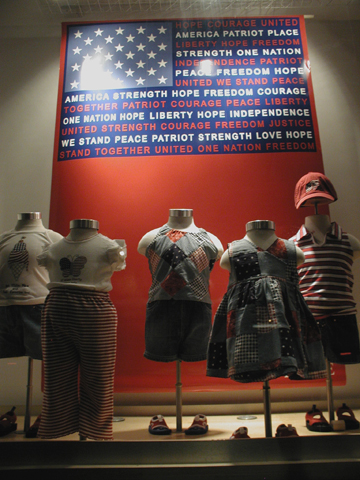
The Spiritual Foundations of Bushism
What do Americans want from their political system?
With the 2004 election looming, the contemporary Left seems baffled at how many Americans repeatedly vote against their interests, and seem about to do it again. Countless ‘Red States' voters prefer Bush's rhetoric of values and integrity to economic policies that would actually improve their lives. They buy this phony rhetoric at high personal cost. Some statistics: 40% of the 2001 Bush tax cut has gone to the richest 1% of American families. The Estate Tax repeal benefits fewer than 2% of Americans, yet it will cost over $50 billion per year once fully phased in. Down the line, you can review every single Bush and GOP policy, and not find a single one that benefits the poorest two-thirds of Americans more than the richest one third. Really, it's quite a remarkable fact. And yet, large numbers of middle and lower-middle class Americans vote Republican. Why?
To simply ascribe the Republican success to "values" is to miss the point. John Kerry proclaims his values at least as often, and nearly as irritatingly, as Bush does. People just don't seem to believe him. There must be reasons why one side's "values" are believed and they other side's aren't. These reasons have to do with the foundations of Bushism – quite different from Repubicanism, as I have elaborated on in some detail in my column in Jewsweek, A Jewish Critique of Bushism – itself.
In this essay, I want to offer not another shallow excuse but a psychologically and perhaps spiritually deeper understanding of American political choice, one which accounts for the Right's astonishing success (controlling all three branches of the federal government, and most states), and which offers an alternative to it. I want to construct and prove the following argument:
1. Politics, like most of life, is based on the primal fear of death. In our dominant culture, consumption is the chief actual remedy for fear, while conservative, patriotic rhetoric is the necessary cover for it.
2. The Right supports economic liberty and social restrictions, whereas the Left supports the reverse. This leads to several problems for the Left. First, because economic liberty is more important to the majority of Americans' life-projects (i.e., because it addresses their fears, and corresponding desires for more life and more possessions), the Right's message of ‘more' will be more likely to succeed than any message of ‘less.' At the same time, because Americans are more used to conceiving moral value in social than in economic terms, so the Right can claim the higher moral ground even as it takes a lower moral path in terms of real-world consequences. The Right has more powerful moral rhetoric, with fewer sacrifices required; the Left's moral rhetoric is less powerful, and requires more sacrifices.
3. Due to the nature of American political discourse, the Left can neither speak in a shallow voice (lock-boxes, health plans) nor try to shift the fundamental definitions of the ‘American Dream' away from economic success. Despite many liberals' own aversion to hyper-capitalist excess, to be the party of obligation instead of desire is to be perpetually in a minority position. The Left must effectively speak to the fear that undergirds our political system. It can do this by articulating a view of moral good and evil, just as the Right does. As the Right subtly cast Clinton's and other Democrats' failings in terms of moral evil, so too the left can cast Bush's policies in the same way, without engaging in extreme rhetoric. The Left can understand Bush's policies as morally evil (here using the term as understood within the Jewish tradition) and articulate them in a non-extreme, skillful way.
• Nothing to fear but fear itself
This past January, my grandmother passed away just as I was completing a two-week meditation retreat. The post-retreat period is always delicate, as the sensitive self re-emerges into a noisy world and as a clinging part of the ego wants to hold onto the sweetness of silence. This time, I was acutely aware of how indirectly we speak, how our emotional needs are subverted by the very tactics our minds use to address them, and how distracted everyone seemed. Returning from sitting shiva in Florida, I noticed that my companions on the airplane were doing anything and everything to avoid the present moment: televisions, magazines (usually both), anything to distract. I was struck: here we are, thousands of feet above the Earth; I am on sensory overload – the quiet roar of the engines, the sensation of motion, the beauty of the sky, the sadness I feel looking down on the patchwork devastation of Florida's natural environment. And yet, what was overload for me was insufficient for other people. Despite the reading, watching, drinking, eating, most were still, clearly, bored.
On contemplative paths, one of the core practices is to relax the mind and be present with whatever is going on at this moment. In theistic systems, the moment of Now is our experience of God; in nontheistic ones, being fully present allows the unity of all Being to be perceived. But in a fidgety, distracted world, we cannot find enough substitutes for Reality. Silence is to be feared, because it is the predicate for presence, seeing the self, even of death. I've heard many people say they are afraid of meditation, because they are afraid of what might come up. So: distraction, which breeds the need for more distraction.
 American culture may be characterized as a culture of distraction. We have grown metaphorically and literally fat, stuffed with cheap (and government-subsidized) food, coated with fats and sugars, and copiously over-entertained. We are unhealthy, surrounded by carcinogenic pesticides, enmeshed in a spider's web of radiation, consuming products which came from laboratories. And of course many of us generate even more fear as a result, hiding away in ever-more-organic safe zones, where somehow we won't be touched by the filth.
American culture may be characterized as a culture of distraction. We have grown metaphorically and literally fat, stuffed with cheap (and government-subsidized) food, coated with fats and sugars, and copiously over-entertained. We are unhealthy, surrounded by carcinogenic pesticides, enmeshed in a spider's web of radiation, consuming products which came from laboratories. And of course many of us generate even more fear as a result, hiding away in ever-more-organic safe zones, where somehow we won't be touched by the filth.



The Spiritual Foundations of Bushism
Jay Michaelson
Sex and the Golem
Joshua Axelrad
How Jewish is Modigliani?
Esther Nussbaum
Steel and Glass
Dan Friedman
No Matter What, I Wish You Luck
Chanel Dubofsky
Falafel Ghosts
Shaun Hanson
Archive
Our 500 Back Pages
Saddies
David Stromberg
Zeek in Print
Spring/Summer 2004 issue now on sale!
About Zeek
Mailing List
Contact Us
Subscribe
Tech Support
Links
From previous issues:
The Hamas Class of 1992
Michael Shurkin
Then
Avi Levy